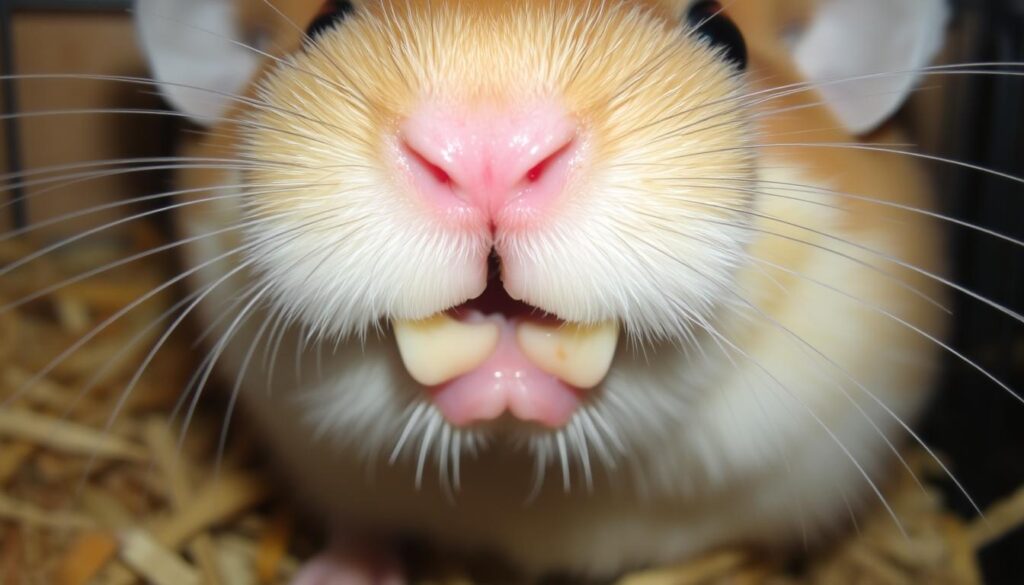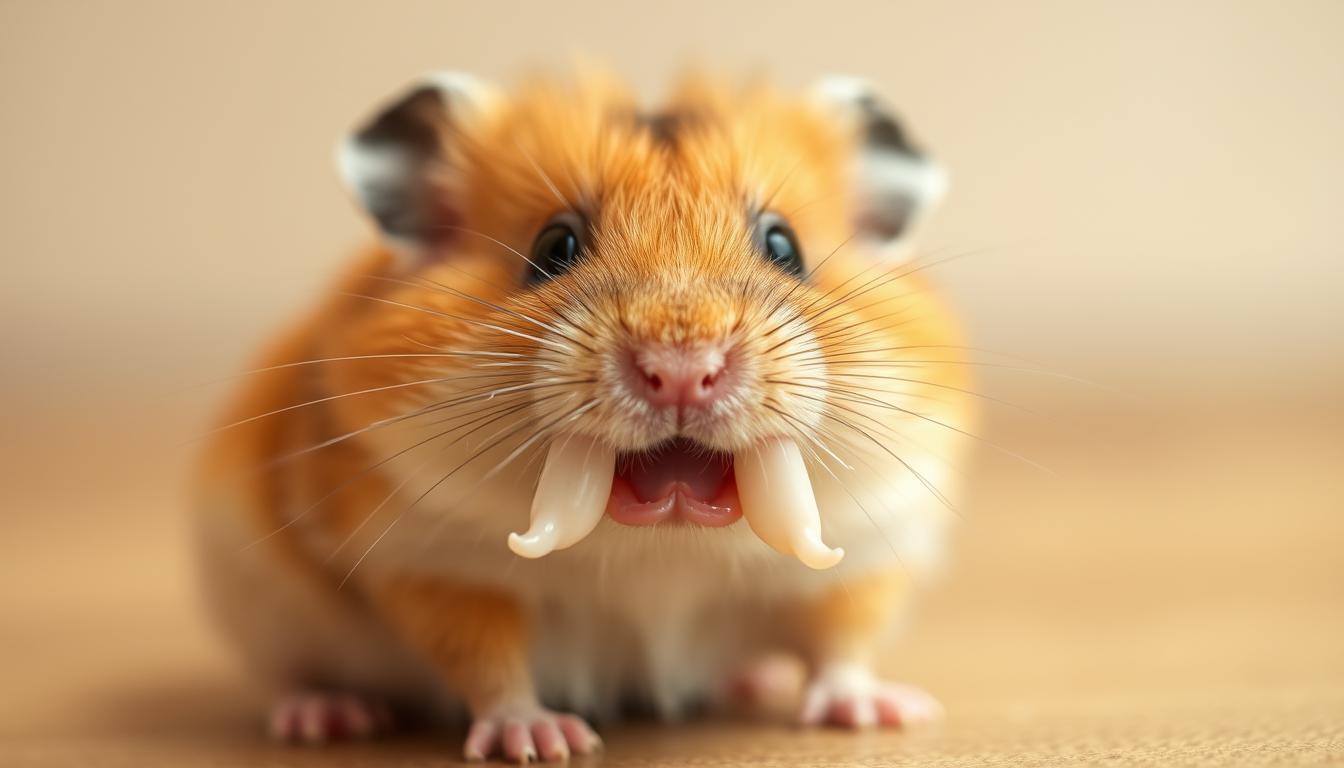Are you a hamster owner who wonders about their pet’s dental health? Keeping their teeth clean is key to their happiness. But spotting dental problems can be tricky. We’ll show you how to spot unhealthy hamster teeth and keep your pet’s smile shining.
Ever thought about how many teeth a hamster has? Knowing about hamster teeth can help you spot dental issues early. We’ll cover the basics to help you understand your hamster’s dental needs.
Key Takeaways
- Recognizing signs of unhealthy hamster teeth is crucial for their overall well-being
- Understanding hamster dental anatomy can help you identify potential issues
- Common dental problems in hamsters include overgrown teeth, misalignment, and abscesses
- Difficulty eating, visible tooth damage, and changes in behavior can indicate dental problems
- Proper dental care, including regular check-ups and providing appropriate chews, is essential for hamsters
Understanding Hamster Dental Anatomy
Hamsters have a special dental structure as rodents. Their teeth grow constantly and help them chew efficiently. This is key for their health and natural behaviors. Knowing about hamster dental anatomy helps in caring for these pets.
How Many Teeth Do Hamsters Have?
Hamsters have a total of 16 teeth. They have four incisors and 12 molars. The incisors grow continuously, like many rodent teeth.
Function of Hamster Teeth
Hamster incisors are crucial for gnawing on hard things like wood and cardboard. This chewing keeps their incisors from getting too long. It also helps them eat without problems.
The molars grind food for digestion. This system ensures hamsters eat well, keeping them healthy.
Knowing about hamster dental anatomy is vital for their care. It helps owners spot and fix dental issues. This keeps hamsters healthy for a long time.
Common Dental Issues in Hamsters
As pet owners, it’s key to know about dental problems in hamsters. Keeping their teeth healthy is vital for their well-being. We’ll look at common dental issues like overgrown teeth, tooth misalignment, and dental abscesses.
Overgrown Teeth
Hamsters’ teeth grow all their lives. They need to chew often to keep them short. Without the right chew toys, their teeth can grow too long. This can hurt their cheeks or tongue.
Tooth Misalignment
Tooth misalignment is common in hamsters. It might be due to genes or jaw injuries. Misaligned teeth make eating hard, leading to poor nutrition and pain.
Dental Abscesses
Dental abscesses are serious in hamsters. They’re infections around the teeth or gums. Poor dental care or health issues can cause them. Untreated abscesses can be dangerous.
Knowing about these dental issues helps hamster owners spot and fix problems. This ensures their pets stay healthy and happy.
Signs of Unhealthy Teeth
Keeping your pet hamster’s teeth healthy is key to their happiness. Paying attention to dental signs helps catch problems early. Here are signs your hamster’s teeth might be unhealthy.
Difficulty Eating
If your hamster has trouble eating or won’t eat, it might have dental issues. Teeth that are too long, crooked, or damaged can hurt while chewing. This makes eating hard for them.
Visible Tooth Damage
Look closely at your hamster’s teeth for any odd colors, cracks, or uneven shapes. Teeth that look different can mean dental problems that need a vet’s help.
Changes in Behavior
Dental issues can also show in how your hamster acts. Watch for signs of tiredness, crankiness, or less interest in play. These could mean they’re in pain or uncomfortable.
By watching for these signs of hamster teeth problems, you can help keep your pet’s oral health in top shape. This is important for their happiness and health as a pet hamster owner.
Importance of Dental Health for Hamsters
Keeping your hamster’s oral health in check is key to their happiness. Hamsters have teeth that grow all their lives. These teeth help them chew, groom, and find food. But, if their teeth grow too long or get crooked, it can hurt a lot and cause serious health problems.
Impact on Overall Health
Dental issues in hamsters can affect more than just their mouth. If their teeth are not cared for, they might not eat well. This can lead to malnutrition and weaken their immune system. They could then get sick more easily.
Consequences of Neglecting Teeth
Not taking care of your hamster’s teeth can cause big problems. These include:
- Painful abscesses and infections
- Difficulty eating and weight loss
- Respiratory issues due to tooth root infections
- Increased risk of organ damage from untreated dental disease
It’s important to take your hamster to the vet regularly. Also, make sure to take good care of their teeth. This will help prevent these serious issues and keep them healthy for a long time.

Regular Dental Care for Your Hamster
Keeping your hamster’s teeth clean is key to their health. Since hamsters’ teeth grow all the time, giving them the right chews and a balanced diet is vital. This helps avoid dental problems and keeps their teeth in good shape.
Recommended Chews and Toys
Hamsters must chew often to keep their teeth from getting too long. Give them safe things to chew on, like:
- Untreated wood blocks or branches
- Hay-based chew toys
- Cardboard tubes or boxes
- Rawhide or other durable chews
These items let your hamster chew naturally, which is good for their teeth and gums.
Importance of a Balanced Diet
A good hamster diet is key for dental health. Make sure your pet eats high-quality pet hamster care food. Add fresh fruits and veggies to their meals. A diet full of vitamins and minerals helps keep their teeth and bones strong, preventing dental issues.
| Recommended Dietary Components | Benefits for Dental Health |
|---|---|
| Hay | Promotes tooth wear and chewing behavior |
| Crunchy Vegetables (e.g., carrots, celery) | Helps file down teeth and clean plaque |
| Vitamin C-rich Foods | Supports healthy gums and immune function |
With the right hamster grooming tools and a healthy diet, your hamster’s teeth will stay strong for a long time.
When to Seek Veterinary Help
As a responsible pet hamster owner, it’s key to watch your furry friend’s dental health closely. Some minor issues can be handled at home. But, there are times when you need a vet to keep your hamster safe and healthy.
Recognizing Serious Symptoms
If you see any of these worrying signs, get vet help right away:
- Difficulty eating or chewing food
- Excessive drooling or wet fur around the mouth
- Visible damage or discoloration to the teeth
- Swelling or inflammation around the mouth or jaw
- Sudden changes in behavior, such as lethargy or aggression
These signs might mean serious dental problems or other health issues. A vet can diagnose and treat these problems.
Regular Dental Check-ups
Even if your hamster looks healthy, regular vet visits are a must. Your vet can check their teeth and mouth. They can spot any problems early and help keep your hamster’s teeth healthy.
At these visits, your vet might suggest treatments like tooth trimming. This helps prevent bigger problems. Taking care of your hamster’s teeth means they can live a long, happy life.
Preventative Measures for Dental Health
Keeping your pet hamster’s teeth healthy is key to their happiness. By taking early steps, you can avoid common dental problems. This ensures your furry friend lives a comfortable, joyful life. Let’s look at some ways to keep your hamster’s teeth in great shape.
Providing Proper Chewing Materials
Hamsters love to chew, and they need the right stuff to keep their teeth healthy. Give them safe, durable chew toys like wooden blocks, cardboard tubes, and hamster-friendly treats. These help keep their teeth in good shape, preventing overgrowth and dental problems.
Monitoring Eating Habits
Watch how your hamster eats closely. Signs like trouble chewing, less appetite, or changes in food choices might mean dental issues. Pay attention during meals and notice any unusual behavior or eating patterns. Spotting dental problems early helps prevent bigger issues.
By giving the right chewing materials and watching your hamster’s eating, you can help their dental health. Being alert and acting fast on any issues keeps your pet happy and healthy.
DIY Dental Checks at Home
Keeping your pet hamster’s teeth healthy is important. But it’s not hard to do. You can check their teeth at home with a few easy steps. This way, you can make sure their teeth stay strong and healthy.
How to Inspect Your Hamster’s Teeth
Gently hold your hamster and tilt its head back a bit. This will help you see its teeth better. Look at the front incisors for any signs of problems. You can also use a small flashlight to see the back molars better. If you see anything odd, talk to your vet.
Regular Health Observations
- Watch how your hamster eats. If it has trouble chewing or won’t eat certain foods, it might have dental issues.
- Notice if your hamster seems tired, less active, or drools a lot. These could be signs of dental problems.
- Look for any tooth damage, like chips, cracks, or color changes.
Checking your hamster’s teeth and watching for health changes is key. By taking care of their hamster teeth and pet hamster care, you can avoid big hamster grooming problems. This way, your hamster can live a long, happy life.

Conclusion: Keeping Your Hamster’s Teeth Healthy
Keeping your hamster’s teeth healthy is key to their well-being. Understanding their teeth helps you spot and fix dental problems early. This way, you can ensure they stay healthy and happy.
Final Tips for Hamster Owners
Check your hamster’s teeth often and give them chew toys. Make sure they eat a balanced diet. Watch for dental issues and get vet help if needed. With care, your hamster’s teeth will stay healthy.
Encouraging Good Dental Hygiene
Good dental care is vital for your hamster. It keeps them comfortable and helps them live longer. With a bit of effort, you can keep their teeth in great shape. This lets them enjoy eating and living their best life.




